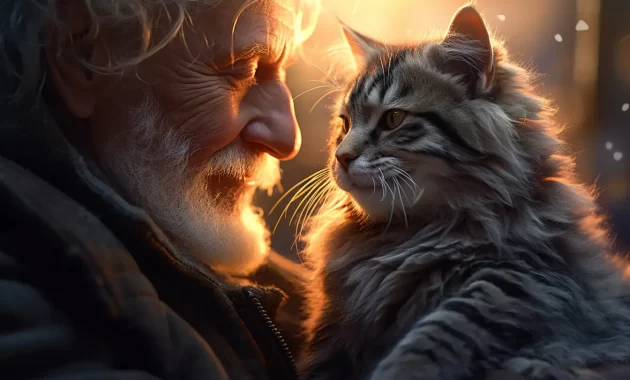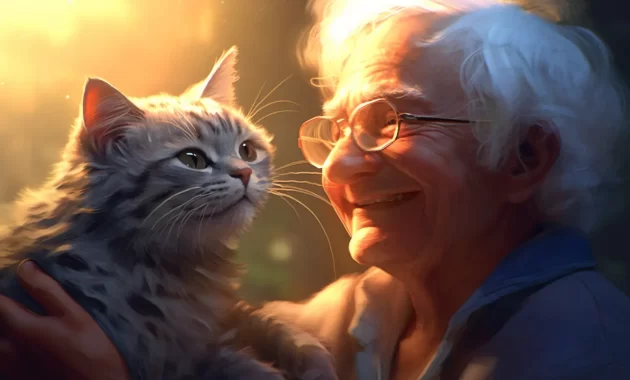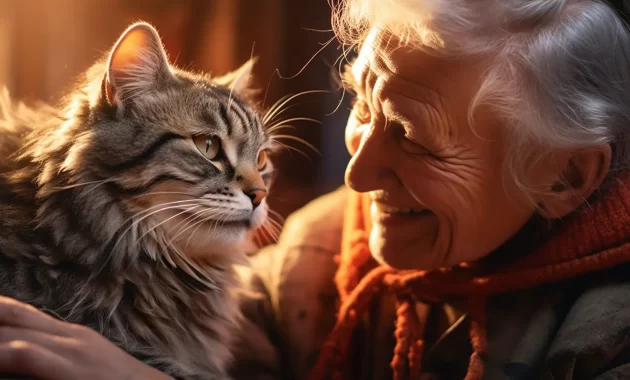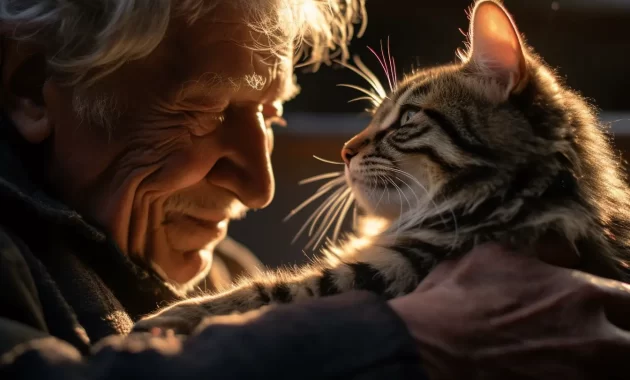
Are you a senior looking for a companion?
Cats make excellent friends that bring joy and love to any home.
From their playful antics to their calming presence, cats can provide seniors with the necessary companionship.
As a senior cat care specialist, I’m here to help you find the right cat for your lifestyle and needs.
Cats come in many shapes, sizes, and personalities.
Finding the right one to fit your lifestyle may feel daunting at first. But don’t worry!
This article explores some of the best cats for seniors – perfect companions for older adults.
We’ll examine how their temperaments, grooming needs, and activity levels make them ideal for seniors with different living arrangements and lifestyles.
So without further ado, let’s dive in!
Characteristics Of Cat Breeds Suitable For Seniors

Finding the perfect cat for seniors can be challenging but worth exploring.
After all, cats are among the most socialized animals, and bonding with your furry friend can do wonders for any senior’s well-being.
I’m a senior cat care specialist, and I’m here to tell you that plenty of breeds out there make ideal companions for older folks!
If you’re looking for a four-legged companion who loves cuddling, then the Ragdoll or Maine Coon may be just the ticket.
Both breeds are known as gentle giants, with sweet dispositions and an affinity for snuggles.
They also tend to follow their humans around, allowing them to keep up with their daily activities.
The Siamese or Abyssinian will fit the bill for seniors who prefer an independent-minded companion.
These cats are curious and intelligent, often finding themselves in places they shouldn’t be!
While they won’t necessarily seek out human interaction like a Ragdoll or Maine Coon might, they’ll still appreciate some quality time spent together—and you’re guaranteed lots of laughs along the way.
So whether you’re looking for a laid-back lap cat or an adventurous explorer, there’s sure to be a breed of cat that will fit into your life perfectly!
SEE ALSO
Cats That Are Good With Children
Cats That Are Good With Families
Pros And Cons Of Long-Haired Vs. Short-Haired Cats

There are many factors to consider regarding cats that are good with seniors.
Long-haired and short-haired cats have pros and cons regarding being a good fit for an older adult’s home.
It is essential to think about the cat’s personality and senior-friendly activities that can be done together.
One of the main differences between long-haired and short-haired cats is their fur length.
Long-haired cats often require more grooming but can provide extra warmth during colder months.
Short-haired cats may be easier to groom but may not provide as much warmth in winter.
Both types of cats come in various colours and personalities, so it is essential to find one whose temperament matches the needs of the senior person.
Cat-friendly personalities are also influential when choosing a cat for seniors.
Some cats may be more outgoing and affectionate, while others may be more independent or shy.
It is best to look for a cat comfortable with being petted, playing games, or just cuddling on the couch with its senior companion.
Additionally, activities such as walks in the park or outdoor playtime can help keep both parties active and allow bonding time between them.
No matter what type of cat you choose, having a furry friend around can bring joy into any home – especially those of seniors who might not get out much anymore due to physical limitations or other health concerns.
Regular interaction with your new pet can help create memorable moments of laughter and love that will last years!
Tips For Buying A Cat For A Senior

Choosing a cat for a senior can be a rewarding experience.
But it’s essential to pick the right one, considering the old’s lifestyle and living arrangements.
As a care specialist for cats who are good with seniors, let me provide some advice on how to do that.
First, consider the exercise requirements of your cat. If you’re looking for an active cat, choose a breed that likes to play and explore, such as the Abyssinian or Bengal.
However, if you want a low-key companion that’s content lying in your lap all day, then try breeds like the Ragamuffin or British Shorthair.
Next, establish a feeding schedule for your pet.
A predictable routine benefits both you and your cat so that you can provide healthy meals on time.
During mealtime, ensure they can access fresh water and their favourite foods – dry kibble is usually best! You may also want to consider adding supplements like fish oil or probiotics to their diet if needed.
Finally, consider how much time you can dedicate to caring for your furry friend daily.
Cats need lots of love and attention from their owners, so ensure you can give them plenty of cuddles and playtime when required! With these few tips in mind, you should be able to find the perfect feline companion for your senior loved one!
How To Prepare Your Home For A Senior Cat
Having decided to buy a cat for your senior loved one, it’s time to get prepared.
Bringing a cat into any home, especially when there’s an old involved, is a necessary process that requires careful consideration.
As a senior cat care specialist, I’m here to help you ensure everything is in order before your new feline companion arrives.
First and foremost, choose toys wisely. Selecting safe and age-appropriate toys for your senior citizen’s needs is essential.
Look for calming toys like soft balls and stuffed animals that won’t pose a choking hazard or other safety risks for your elderly family member.
You may also want to find interactive toys that allow the senior and the cat to enjoy quality bonding time together.
Next, consider where to place the litter box. Make sure it’s easily accessible; if possible, place it on the first floor so there are no stairs or elevators involved with getting there.
Also, ensure enough room around the box – cats need easy access and plenty of space when they do their business!
Finally, remember that some seniors have mobility issues that can limit their ability to clean up after the pet; keep this in mind while selecting litter box type and location to make cleanup as easy as possible.
By taking these steps now, you’ll be helping ensure a smooth transition for your senior and your new cat once they arrive home!
Following these tips will provide a safe environment so everyone can relax and enjoy each other’s company without worrying about potential hazards or accidents later on down the line.
Caring For A Senior Cat
Caring for a senior cat may seem daunting at first, but it can be gratifying with the right approach.
As a senior cat care specialist, here are some tips on how to make sure your kitty is happy and healthy in their golden years:
Interactive play is essential for keeping your older cat active and engaged.
Switching up your toy selection is crucial so they don’t get bored. Ensure you have plenty of toys they can explore and enjoy, such as teaser wands or puzzle feeders.
In addition to playtime, keeping up with your senior cat’s medical needs is essential.
Regular veterinary visits should be scheduled to ensure any health problems are addressed early on. Ensure you provide them with the proper nutrition and supplements for their age.
Be sure to also watch for any changes in behaviour that might indicate an underlying health issue.
By giving your senior cat plenty of love and attention, proper nutrition and exercise, you can ensure they live a long, happy life!
Cat Profile: long hair Russian blue cat
https://toppetshop.co.uk/russian-blue-longhair-cats/
Frequently Asked Questions
How Often Should A Senior Cat Visit The Vet?
Senior cats should visit the vet at least once a year for regular checkups, but more often if there are any health concerns.
Studies show that 50% of cats over 10 have some form of chronic illness, so staying on top of your cat’s nutrition and health is essential.
As a senior cat care specialist, I recommend scheduling monthly checkups with your vet to ensure that any disorders or illnesses can be managed quickly and efficiently.
What Age Is Considered A Senior Cat?
It is generally accepted that cats over the age of 7 are considered senior cats.
When caring for your senior cat, being mindful of their socializing needs and longevity tips is essential.
As cats age, they may require more frequent vet visits and exceptional attention to their diet and exercise routines.
Ensuring they get plenty of love, playtime, and mental stimulation can also help extend their life expectancy.
Senior cats can thrive in a loving home environment if they’re provided with the correct care and attention.
Are There Any Health Risks Associated With Getting A Cat For A Senior?
As a senior cat care specialist, I’ve seen many elderly cats age gracefully with the help of a loving companion.
But before bringing a new pet into your home, it’s essential to consider any potential health risks associated with owning a cat in older age.
Socializing cats can be difficult, as they often require more attention and stimulation than other animals.
That said, studies have shown that cats can be beneficial companions for seniors by providing emotional support and promoting feelings of comfort and security.
While some potential health risks are associated with getting a cat for a senior, these risks can be minimized with proper preparation and care.
What Kind Of Toys Are Best For An Elderly Cat?
Regarding toys, elderly cats need something low-impact and interactive.
Luckily, there are plenty of options available that can provide your cat with the stimulation they need.
Interactive toys like dangling feathers or robotic mice can help keep them active without putting too much strain on their body.
Low-impact exercise items like puzzle feeders or a scratching post can also be great for your senior cat.
Giving your elderly feline these toys will keep them entertained and help them stay fit and healthy for years.
How Can I Help A Senior Cat Adjust To A New Home?
When bringing a senior cat into a new home, creating an environment that will help the cat adjust is essential.
This can be done by socializing them regularly and providing enough enrichment activities for them to enjoy.
Add cat-friendly toys like interactive or puzzle feeders to encourage physical and mental stimulation.
If your senior cat is uncomfortable in their new home, try introducing items from their previous home with familiar scents, like bedding or toys.
Finally, give your senior cat plenty of space to explore and relax to help them adjust more quickly.
Conclusion
Seniors must ensure their cats get the proper care and attention they need.
Regular vet visits, appropriate toys and a safe environment will help keep them healthy and happy.
As a senior cat care specialist, I always recommend that seniors get to know their cats before bringing them home.
This helps them adjust more efficiently and build trust with their new owners.
With patience and love, seniors can build lifelong bond with their furry friends.




